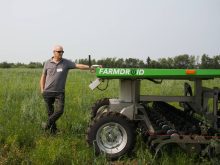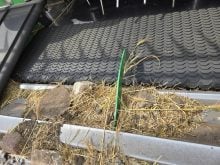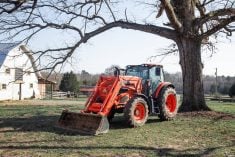As a lifelong promoter of oats, Vern Burrows is definitely biased.
However, the Agriculture Canada oat breeder is convinced hulless oats could be a huge opportunity for Canadian farmers.
“Canada could use a crop like this because I think our farmers need something that would give us an advantage internationally,” Burrows said.
“There are very few countries that have high class oats for sale internationally …. We need to get into the food markets and cosmetic markets and pharmaceutical markets in order to make money.”
Read Also

New coal mine proposal met with old concerns
A smaller version of the previously rejected Grassy Mountain coal mine project in Crowsnest Pass is back on the table, and the Livingstone Landowners Group continues to voice concerns about the environmental risks.
Burrows has worked as an oat breeder with Agriculture Canada for 51 years, breeding and registering 27 oat varieties, including Hinoat, a variety used by General Foods to make Alpha Bits.
Although he officially retired in 1997, Burrows holds the position of research scientist emeritus at Agriculture Canada’s Eastern Cereal and Oilseed Research Centre in Ottawa.
The title is not honourary, however, because he continues to put in at least 40 hours a week at the centre.
“Same as I did when I worked. Monday to Friday and sometimes even on Saturday, if I have to come in,” said Burrows, who grew up in Winnipeg and received his master’s degree in plant science at the University of Manitoba in 1953.
“I’m a volunteer so I don’t get paid. But I enjoy it. That’s why I do it,” he said.
“I’m not going to sit around and watch TV all day, that’s for sure.”
Excited about oats
Bill Collins, a colleague at the Ottawa research centre, said Burrows still gets excited about looking at test plots of new oat varieties.
“Nowadays, you’ll find that many oat breeders don’t even go out to the field much. They sit in their lab and have a technician go out to do all the character traits,” said Collins, a biochemist who collaborates with Burrows on oat research.
“Vern loves to go out and look at oats and look at the variation …. He is probably the premier oat breeder in the world.”
Burrows received the Order of Canada in 2001 for his lifetime of work on oats, but he isn’t the type to rest on his laurels.
In retirement he has continued to promote the untapped promise of oats, primarily focusing on the potential of hulless varieties.
“I figure that going the hulless route is kind of the last step in the evolution of oats,” said Burrows, in an interview from his office in Ottawa.
Working with Collins, Burrows has developed many varieties of hulless and hairless oats over the last 10 years.
One of those varieties, AC Gehl, was registered and released in 2008. Scott Sigvaldason, a farmer and entrepreneur from Arborg, Man., is marketing that variety and selling it to restaurants as a replacement for rice.
“It looks, cooks and tastes like rice, but it is oats,” Sigvaldason told CBC radio in Manitoba.
“Instead of oats being relegated to breakfast, it now goes to supper in fine dining restaurants.”
Sigvaldason recently appeared on the popular CBC program, Dragons’ Den, and secured a $250,000 investment in his business.
Burrows is confident Sigvaldason is onto something because of the potential to cut into the rice market.
“We import about $350 million worth of rice every year and oats have about twice as much protein as polished rice,” he said.
“You’re not going to get all the rice eaters to give up rice. But … if you mix the oat groat with rice they’ll mainly buy it. And it tastes pretty good.”
Along with the nutty taste, Collins said oats have other beneficial properties. He has done work with researchers at the University of Tufts demonstrating that avenanthramides, compounds found only in oats, can slow atherosclerosis, which is the thickening of artery walls because of the buildup of fatty material.
Collins has also studied the potential of using oats for cosmetics and pointed to the use of oats in skin care products such as Aveeno.
Burrows has travelled to China, encouraging farmers there to grow hulless oats as a replacement for rice.
“In the future we’ve got to be very careful about this rice business because it uses too much water,” said Burrows, who received the Friendship Award from the Chinese government in 2003 to recognize his assistance.
Burrow’s determination to spread the word about oats’ potential may be explained by his respect for Baldur Steffanson, the father of canola.
“I think Steffanson was a great influence on Vern, because he could see that if you stuck at it, you might end with something that was totally new,” Collins said.
“That you could actually start out with no market and breed for a market that wasn’t there, that’s a difficult thing to do.”
Despite the challenge, Collins is convinced Burrows’ perseverance will eventually pay off.
“I think eventually, if this thing catches on, it will mean the end of covered oats worldwide.”

















